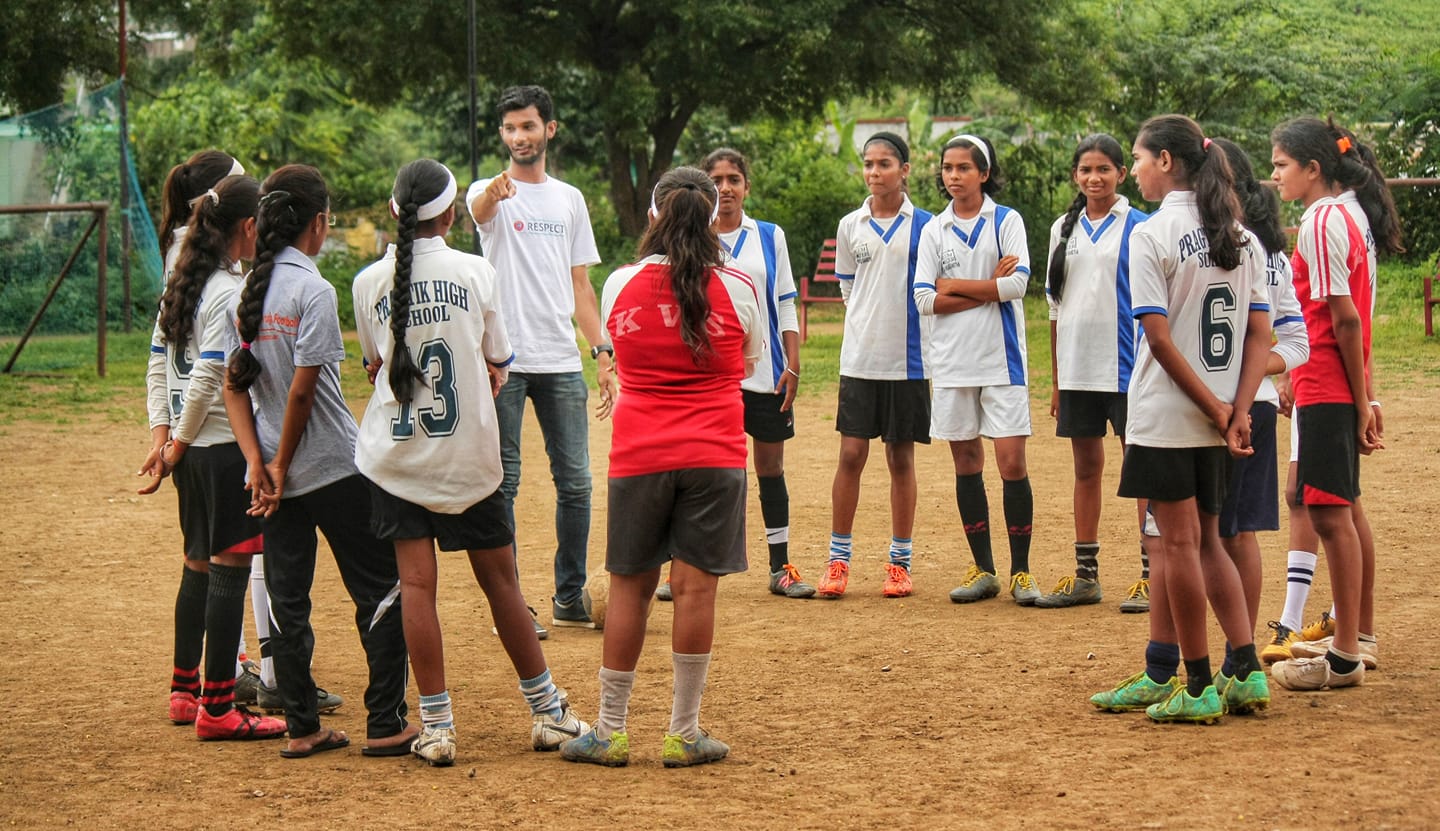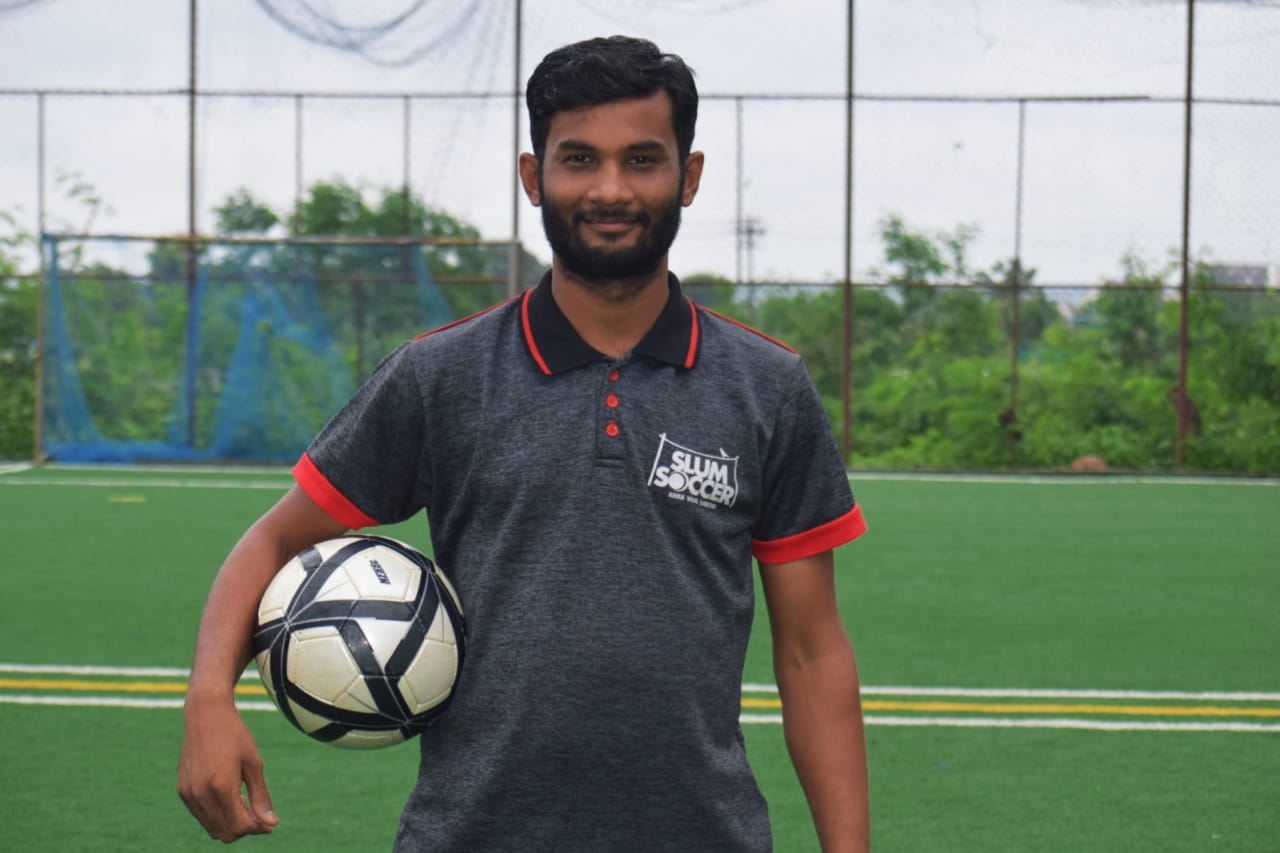
Youth Leadership in Focus: Slum Soccer’s Coach Pankaj
April 30, 2021
In recognition of the launch of applications for our new Beyond Sport Youth Advisory Board, we've taken a month-long focus on exceptional young leaders we’ve come to know over the years. Today we feature Pankaj Mahajan, who spoke to us about his passion for football and being a mentor to children who are growing up in similar circumstances to his.
26-year-old Pankaj Mahajan comes from Godhani, a small village in Nagpur District Maharashtra, India. He grew up in difficult circumstances, witnessing and being a victim of domestic violence by his alcoholic father. Pankaj escaped to the streets of India, dropping out of school and succumbing to addiction.
Slum Soccer, a FIFA awarded Sport for Development organisation that uses football to do outreach to the Indian homeless population, met Pankaj during this time and invited him to join in their activities in 2010. “They introduced me to football when I was in desperate need of the beautiful game. It not only engaged me but also educated me, and ever since that day, I’ve continued to play and explore.”
Things changed for the better for Pankaj and he was encouraged to continue his education, ultimately attaining a degree in Physical Education and a passion for the game. After experiencing first-hand how football can bring about a sustainable change in life and society, he has since become a strong mentor and coach. He is now the Project Head of the Shakti Girls Project and the DeafKidzGoal Project.
The Shakti Girls Project educates and empowers underprivileged girls residing in slum communities. In most cases, their families are highly conservative, misogynistic and have a strong patriarchal mindset. “My desire to empower and uplift these girls is what motivates me to continue striving to bring about a positive paradigm change in the lives of these young girls.” The DeafKidzGoal Project provides sports training and basic life skills to deaf children, spreading deaf awareness and promoting inclusion.
Pankaj's hard work paid off when he was selected to represent his district and state in the National Inclusion Cup 2012 in Bangalore, India, and then at the 2013 Homeless World Cup (HWC) in Poznsan, Poland. “My joy and pride knew no bounds when I wore the jersey with India emblazoned on it. That is when I realized that it represented something bigger than me.”
In Poland, Pankaj had the opportunity to interact with youth from other countries, which made him realize the importance of education and communication in achieving personal success. The experience sparked a passion for coaching and furthering his studies. Upon his return to India, he began engaging children in his community. “I attempted to transform those who had strayed off from the right path, just like the Slum Soccer coaches had done for me.”

He was also chosen to coach the Indian team at the 2017 HWC in Oslo, which further broadened his horizons. Pankaj believes that proactiveness, hard work and resilience are his key leadership strengths. His faith in the power of information and education contributed to him becoming a leader in his community.
“Never stop learning because life never stops teaching. I am constantly seeking knowledge and improving my awareness of many larger issues such as environmental issues, child rights, gender equality, inclusion, safeguarding children, etc.”
Pankaj has adopted football and sports as a tool to improve other people’s lives and create positive change in his community. “I believe that football inherently offers a transferrable set of skills for social development, through team building, acceptance and discipline.”
He engages young children and youth on health and wellness, gender equality, the importance of education, and importantly, on how addiction can destroy families and a community.
Young leaders can deeply connect with the young people they coach, and Pankaj feels that one of these advantages is being from the same background as his participants. He is familiar with their difficulties and constraints and can easily communicate with them as he’s travelled the same path they are on.
“All I do is ask them to kick a ball. That simple act is therapeutic in itself. As a first step, I attempt to give my players hope and purpose. My community space acts as a safe place free of discrimination, providing positive role models and a place to develop and express oneself freely.”
With the pandemic causing an unprecedented disruption in everyone’s lives, the importance of sport in helping people stay physically and mentally fit cannot be reiterated enough says Pankaj. He has been in constant contact with his participants, advising them to adopt appropriate COVID-19 behaviors and safeguards.
“I continue to lead them through yoga and exercise sessions for ensuring their pent-up energies find an outlet and they do not fall prey to lockdown lethargy. During online sessions we also discuss the developments happening in an around them as well as throughout the country and the world. This makes them feel connected and helps them overcome the trauma and loneliness.”
The second wave of pandemic has also made a huge impact recently in India with the death toll climbing every day. Pankaj said, "with the help of my staff and players, we are spreading awareness about the importance of vaccination. The players and staff will be educating the communities, mostly adults who haven't got vaccination yet."
Having recently completed a Premier Skills education program, Pankaj also shares with others how football changes life, society and perspective. “It is my turn to return the obligation multifold by mentoring, guiding and inspiring many more children to take the road to progress and build a bright and better future for themselves.”
Slum Soccer were 2019 Beyond Sport Global Award shortlisters for the Sport for Health and Wellbeing Award